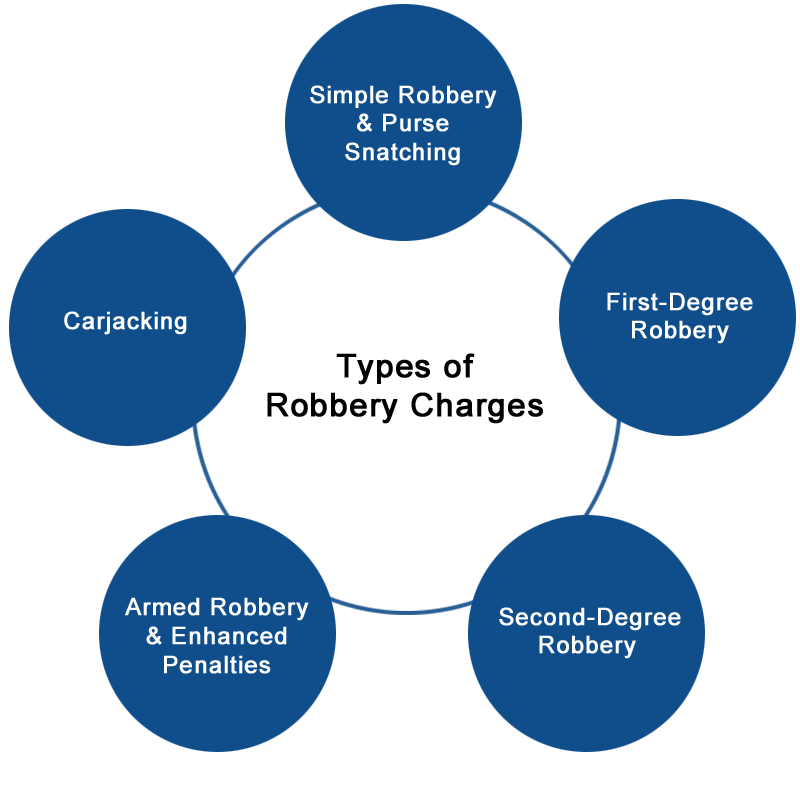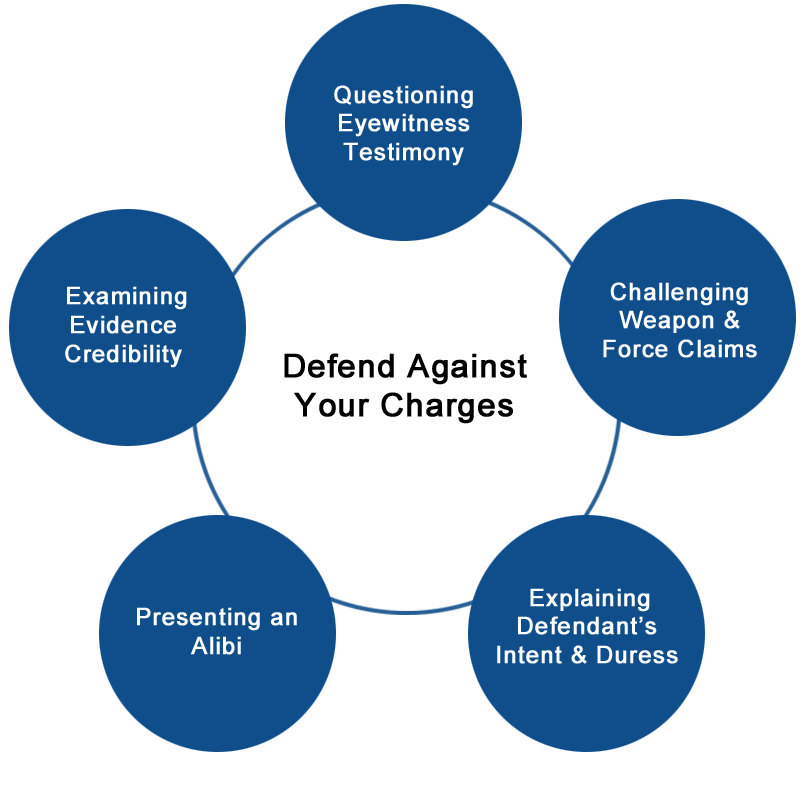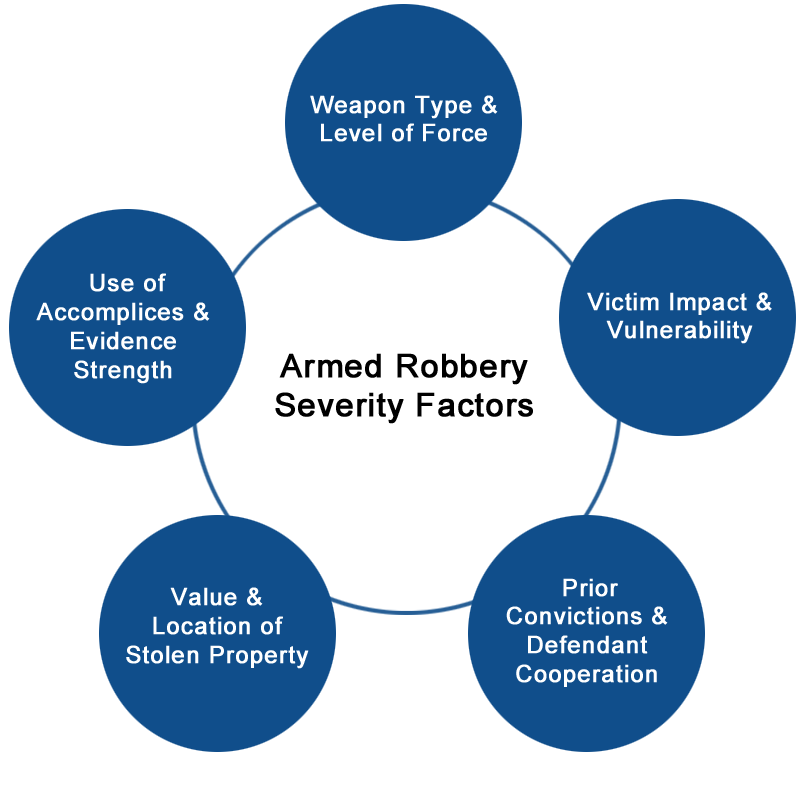
Armed Robbery in Louisiana
Among the many illegal acts described under Louisiana law, armed robbery is considered one of the most serious, carrying massive legal consequences for those convicted. In the following guide, you gain a more thorough understanding of this charge and what it means, both in terms of the specific penalties and consequences as well as how to defend against these charges.
What is Armed Robbery?
As defined under Louisiana Revised Statute 14:64, an armed robbery occurs as “the taking of anything of value belonging to another from the person of another or that is in the immediate control of another, by use of force or intimidation, while armed with a dangerous weapon.”
This phrasing breaks the law down into four important criteria:
“The taking of anything of value,” which can range from personal belongings to money.
“From another person,” which requires armed robbery to include a direct confrontation with the victim.
“By force or intimidation,” allows armed robbery to either include violence or the threat of violence.
“While armed with a dangerous weapon,” whether that means a firearm or a knife. This weapon does not need to be used for the crime to be considered armed robbery, as long as it is present and used to intimidate. In fact, the weapon does not even need to be the real thing. Even using a prop gun can lead to armed robbery charges if the victim has a reasonable belief that it is a real weapon.

 There are several different types of robbery charges described under Louisiana law. They include:
There are several different types of robbery charges described under Louisiana law. They include:
- • Simple Robbery (Louisiana Revised Statutes § 14:65): Taking something of value from another without a weapon, but rather through force or threats of violence. Can lead to 7 years in prison, up to $3,000 in fines or both. First-time offenders may be eligible for probation, and parole is possible with good behavior.
- • First-Degree Robbery (Louisiana Revised Statutes § 14:64.1): Taking something of value from another without a weapon, by leading them to believe you have a weapon. This can lead to up to 40 years in prison without the possibility of parole, probation or early release.
- • Second-Degree Robbery (Louisiana Revised Statutes § 14:64.4): Taking something of value from another person without a weapon, by physically injuring them to a serious degree. Can lead from 3-40 years in prison, potentially at hard labor. While the possibility for probation is unlikely, parole may be possible.
- • Armed Robbery (Louisiana Revised Statutes § 14:64): As described above, taking something of value while armed with a dangerous weapon. This can lead to a hard labor prison sentence of 10-99 years without the possibility of parole, probation or a suspended sentence.
- • Armed Robbery with enhanced penalties for using a firearm (Louisiana Revised Statutes § 14:64.3): In cases where the offender was carrying a gun during the robbery, Louisiana law adds an additional five consecutively served years onto a prison sentence.
- • Carjacking (Louisiana Revised Statutes § 14:64.2): Taking a person from their vehicle by force or threats in order to steal the vehicle. This can lead to a hard labor prison sentence of between 2-20 years, with probation and parole possible depending on the circumstances.
- • Purse Snatching (Louisiana Revised Statutes § 14:65.1): Taking a purse or wallet from another person by force or by using threats, but without a weapon. Is often handled the same way as a robbery, depending on the situation, with a prison term of up to 20 years. Parole may be possible, as is probation for first-time offenders.
In addition to the penalties described above, every form of robbery carries the possibility that those convicted will be required to perform community service, attend anger management classes, and pay restitution to their victim.
It’s important to note that under Louisiana law, all forms of robbery, from simple robbery to armed robbery, are considered felony offenses. As the most serious of crimes, they carry significant consequences including hard labor requirements for those convicted of armed robbery and first-degree robbery. Hard labor describes a prison sentence, to be served in a state correctional facility, which requires physical labor in areas within the prison system including manufacturing, maintenance or agricultural work. Because of the physically strenuous nature of a hard labor sentence, it is considered a much more severe form of punishment than a standard prison sentence. While it is a mandatory consequence for armed robbery and first-degree robbery, it can be applied in lesser convictions like simple robbery depending on the particulars of the case.
What Factors Determine the Severity of an Armed Robbery Charge?
With the prison sentence for armed robbery ranging anywhere from 10 to 99 years, there are obviously a multitude of factors that determine how serious the crime was, and thus how significant the penalties should be. Below are a few of the largest factors that prosecutors will use to determine the severity of the crime.
Type of Weapon Used: A pen knife doesn’t present as much mortal danger as a firearm, so there is significant variance in sentencing based on the weapon. The use of firearms in particular leads to greater penalties, with those penalties rising based on their type, e.g. semi-automatic vs automatic.
Prior Convictions: If the charges represent a first offense, sentencing may be more lenient than if the defendant has prior convictions, particularly if they were for robbery or a violent crime. Under Louisiana’s habitual offender laws, the more prior convictions, the greater the sentence.
Injuries to the Victim: Even if the weapon in question was not used to cause it, injuries sustained by the victim can impact sentencing. In cases where the victim is severely injured or the act was particularly violent, prosecutors may seek out aggravated robbery charges. In cases where the victim dies, murder charges may follow.
Value of Stolen Property: While the actual threat or injury that the defendant used in committing the robbery plays a larger role in sentencing, the dollar value of the property that was stolen does have an effect. The greater the value, the longer the sentence, particularly in high-value items or vehicles which can result in additional charges such as carjacking.
Number of Victims: A defendant who has robbed multiple people simultaneously, or who chained several robberies together in succession, may face multiple charges, which increases the overall severity of the crime.
Location of the Crime: Robberies that are committed within certain protected areas such as banks, schools, or government buildings may yield more serious charges and greater consequences.
Level of Force Used: In cases where the defendant made extreme threats of physical violence, or took hostages during the commission of the robbery, more serious charges may result including aggravated robbery or kidnapping.
Use of Accomplices: A defendant who is found to have worked alone will likely face less severe charges than if they had committed their crime as part of a group or a gang, particularly if the prosecution can prove a conspiracy to commit robbery.
Age or Ability of the Victim: If the victim of the robbery was a child, a senior citizen, or has a mental or physical disability, the defendant could face an elevated charge of aggravated robbery, with greater consequences.
Strength of Evidence: If the prosecution is able to compile compelling evidence against the defendant, such as surveillance footage showing the act, they may seek harsher penalties.
Defendant Cooperation: Some leniency may be granted to those who voluntarily surrender to law enforcement or cooperate with investigations into other crimes or accomplices.
 How to Defend Against Charges of Armed Robbery
How to Defend Against Charges of Armed Robbery
As with any criminal charge, there are several ways to defend against armed robbery charges in a court of law. Depending on the circumstances of the case, the defendant and the victim, a defense attorney may employ one of more of the following defenses:
Questioning Testimony: Eyewitnesses can make mistakes, identifying the wrong person or seeing a dangerous weapon where there was none. Victims can fabricate testimony, making false allegations against the defendant.
Contextualizing the Incident: Armed robbery requires the presence of a weapon, so it is possible to show that there was no weapon and see charges reduced. Likewise, your attorney could show that the use of force or intimidation was exaggerated or non-existent.
Explaining Defendant’s Circumstances: This could mean showing that the defendant didn’t intend to commit the crime in question. It could mean proving that they acted under duress, committing the crime to protect others under threat. It could also mean using an addiction to drugs or alcohol to explain the defendant’s actions.
Providing an Alibi: Being able to prove that the defendant was in another location when the robbery occurred could lead to all charges being dropped.
Even if a defendant is found guilty, there are still strategies your attorney can employ to potentially reach an alternative outcome. While Louisiana law is clear in withholding the possibility of parole, probation or suspended sentences for armed robbery convictions, there are still ways to mitigate the consequences.
For example, the defense council could seek a plea bargain from the prosecution, striking a bargain to reduce charges to a lesser offense such as simple robbery or first-degree robbery, which carry significantly lower penalties than armed robbery. The defense could also show how the defendant’s circumstances, such as their age, lack of prior convictions or mental health issues, make them more favorable for a plea negotiation to reduce their sentences. The defendant could cooperate with authorities on a separate investigation in exchange for a reduced sentence. In cases where the defendant is under 18, they could seek out juvenile rehabilitation programs to reduce their sentence.
The Claiborne Firm Difference
Being accused of armed robbery is not the same as being guilty of armed robbery. At The Claiborne Firm, we protect your constitutional rights with a winning strategy built on exhaustive investigation. When you hire us, you get a team that can dig deeper than the prosecution, turning up everything from forensic data to police reports that are then meticulously analyzed and scrutinized.
That comprehensive knowledge of your case helps us take the fight to the prosecution, weakening their argument by challenging their evidence, exposing weaknesses in their case and convincing the jury of your innocence. The prosecution may seem like they have all the power, but the State of Louisiana provides strong constitutional protections that allow you to present your story and dispel any doubts about your innocence.
It’s an approach we developed because of our mission to protect the rights of our fellow Louisianans, helping to relieve the stress and burden of fighting charges like armed robbery. You’re not facing these charges alone. We’re fighting right alongside you and we won’t stop until we’ve secured the best outcome. Reach out today for a free consultation.
Call (504) 294-8552 or Schedule a Free Case Evaluation Online

